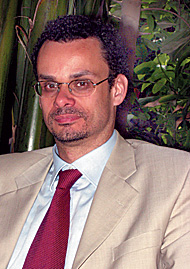JEDDAH, 18 May 2004 — “We feel it is vital to have an Arab contribution to our discussions,” said Professor Xenophon Contiades of the Center for European Constitutional Law, “because we believe that the Saudi people have their own way of perceiving democracy.”
Professor Contiades visited Jeddah recently to establish links between political scientists in the Kingdom and the Themosticles and Dimitris Foundation — a non-governmental organization based in Athens. The function of the foundation is to carry out theoretical and applied research in the fields of Greek and European public law.
Dimitris Tsatsos, the founder of the organization, has developed close contacts with several Saudi academics who have written extensively on the political system of the Arab world and Saudi Arabia. “We are very interested in the comparison between different legal cultures and political structures, legal and political civilizations and ways of structuring the state,” said Prof. Contiades, “and actually coming to the Kingdom has been a valuable learning experience.”
The foundation, apart from compiling academic research, has a practical aspect. It acts as a source of skills and experience to advise and support emerging nations in structuring their political and legal frameworks. “It’s a process of learning and sharing,” Contiades said.
The EU encourages NGOs to help them to set up their administration and public policies. “That’s when we get involved — either through the development assistance of the national states of the EU or the invitation of the EU Council itself.”
“I know roughly what I will hear from a British or Canadian academic,” he said speaking of the reason behind his visit to the Kingdom, “but I am really curious to hear what an Arab academic or social scientist would tell me. I very much hope to open dialogue with Saudi thinkers.”
He perceives the need for dialogue between cultures and nations as greater now than ever before. “Greece was never a colonizing power,” he said, “so we have a good relationship with Arab countries and we find they trust us. Greece is seen more as a civilizing power than an imperial power.”
The concept of Western democracy, of course, is originally Greek. Contiades feels that while it is the prevailing one in the Western world, there are other, equally valid interpretations. At the simplest, he defines the term as a state where the people rule. “The way that they rule themselves is not only the Western democracy model; that’s where we could also learn from the Arab world. I am sure there are other ways of structuring democratic institutions.”
Whilst the concept includes the ability to select, elect and change leaders and the people at the bottom of the state bureaucracy are listened to by the people at the top, he says that he also did not believe democracy could exist without fundamental rights. “Rights are a prerequisite of democracy.”
Prof. Contiades turned the spotlight on the assumption within Europe and the West that the European Union is a democracy, even on its own terms.
“If we set the standards that define a member state as democratic, would the EU itself be democratic? It has a set of rules that define democracy — but itself it does not respect the rules.” He felt that when the EU criticised other states as “undemocratic”, it was simply operating democracy of a different kind.
He says he learned much during his short visit to the Kingdom. “Primarily,” he said, “That is a myth that Arabs — and Saudis particularly — are not open-minded. It’s another myth that they don’t want to meet with and learn from European culture.”
He felt that Europeans had many things to learn from Arab culture, and that open dialogue, transparency and goodwill were the most effective routes.
“It’s also a myth that women have nothing to do with business in the Arab world. We’re already working in Syria with women’s organisations and seeing how we could promote women in business,” he said.
“We are trying to help them to help themselves. I think the same thing could be done here, from what we have seen.”
On Sept. 9 and 10, the foundation is holding a congress in Athens titled “Democracy and Security in the Risk Society”. The date was chosen specifically to coincide with the third anniversary of the attack on New York “taking into account the popularity of the Huntingdon’s theory of the ‘clash of civilizations,’ we believe that without the Arab contribution, the conference will be much poorer.”


